2023 Hyundai Kona Electric Review and Test Drive
Ditching fossil fuels can come with compromises in winter.
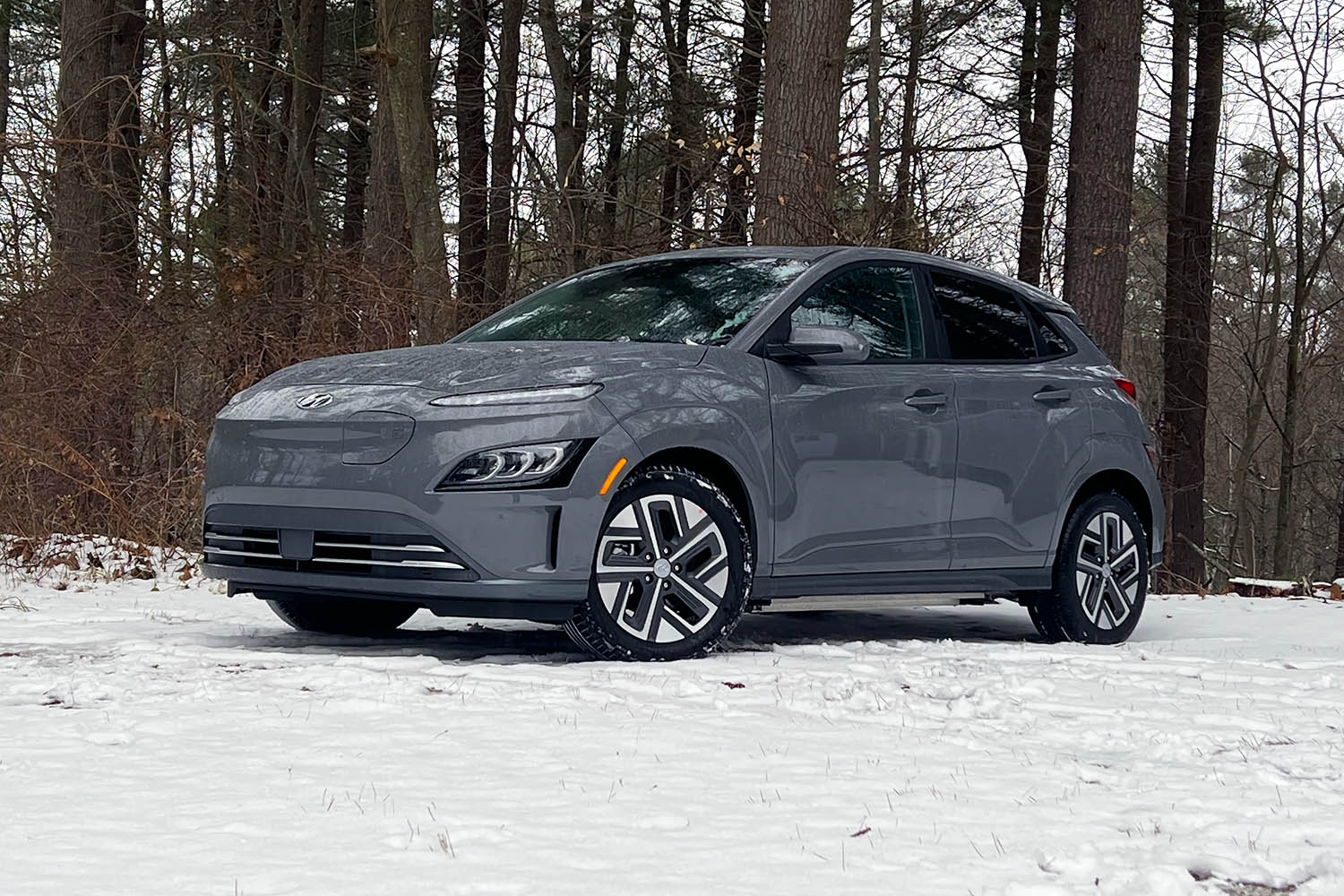 Thom Blackett
Thom Blackett
Though small in stature, the 2023 Kona Electric is seen by Hyundai as a key player in its electrification strategy. Following a recall related to battery fires that overshadowed the Kona Electric in 2019 and 2020, the vehicle arrives in 2023 with more extensive standard features and three available trim levels: SE, SEL, and Limited.
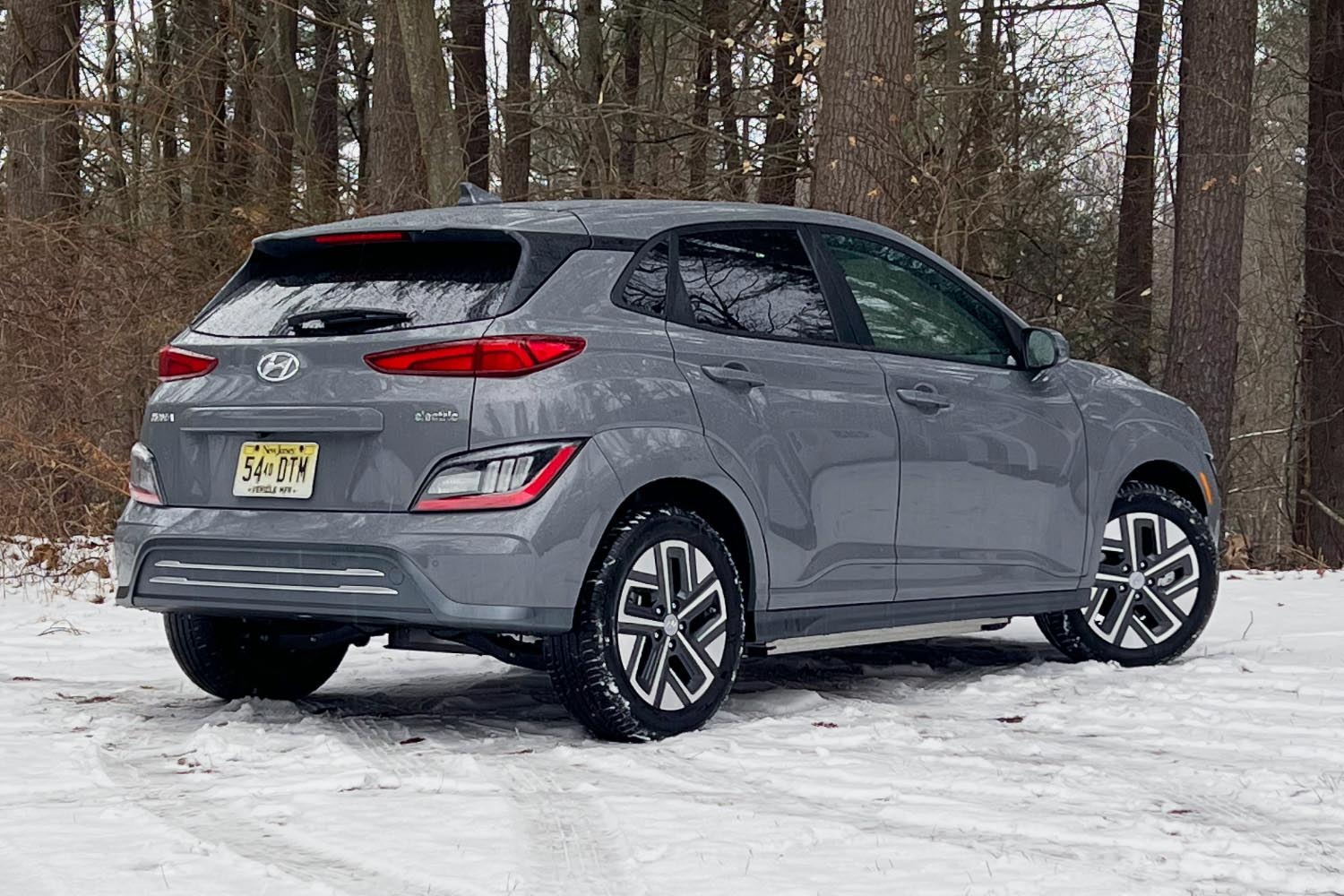 Thom Blackett
Thom Blackett
Base prices for the 2023 Hyundai Kona Electric range from the mid-$30,000s to the mid-$40,000s, including the destination charge. At the time of this article's writing the 2023 Kona Electric is available only in certain states*.
For this Kona Electric review, I test-drove a Limited trim in New England in the dead of winter. The only option was a set of carpeted floor mats, which brought the manufacturer's suggested retail price to $43,095, including the $1,335 destination charge. Hyundai provided the vehicle for this review.
The 2023 Hyundai Kona Electric's Design
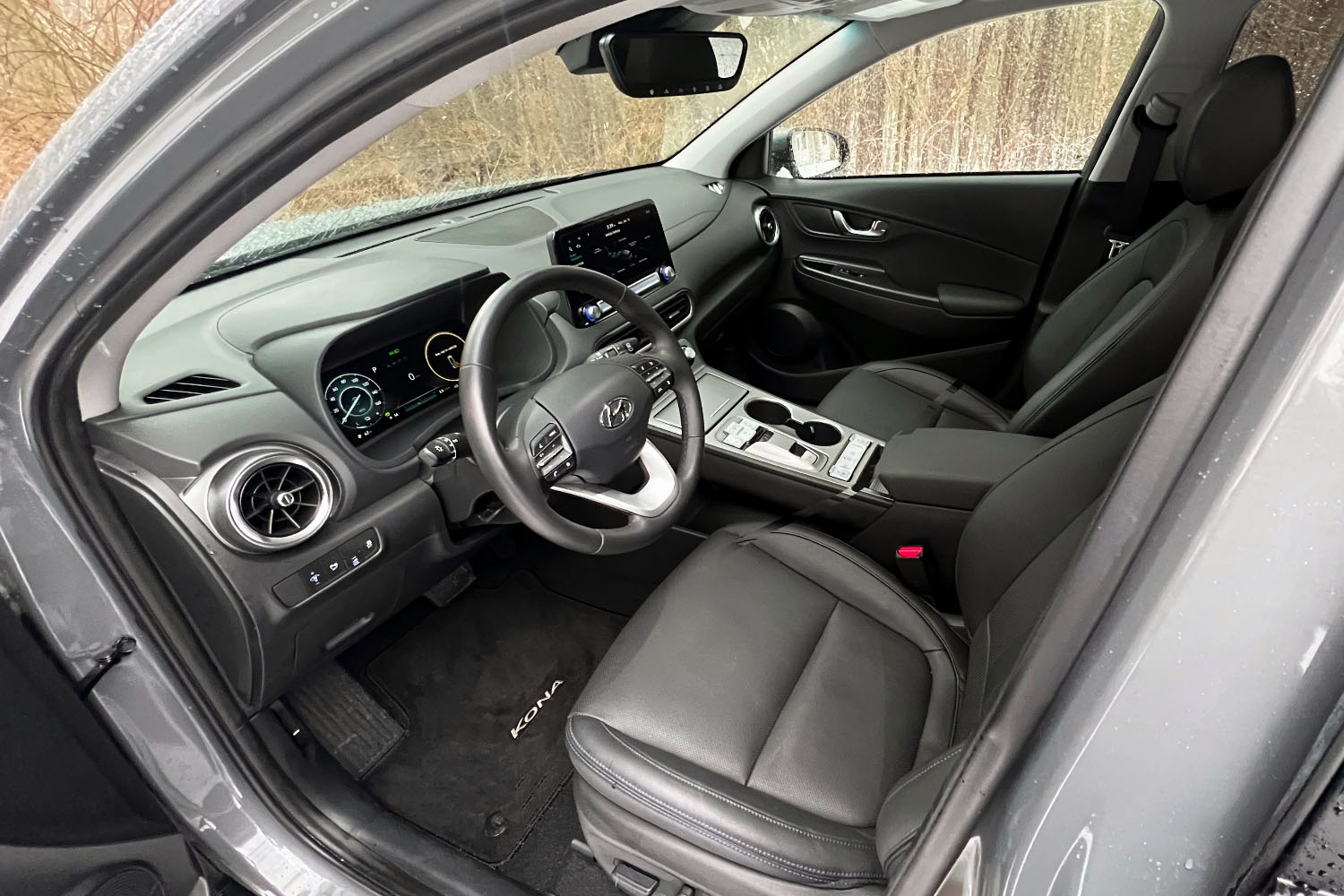 Thom Blackett
Thom Blackett
To my eyes, the Kona Electric's design is too busy; that said, I can't accuse it of being dull. The EV is full of prominent character lines, in addition to stacked front and rear lights and an expansive front end devoid of a traditional grille.
The interior, on the other hand, had a calmer and more contemporary appearance. I was pleased to find padded armrests on the doors and between the front seats, perforated leather upholstery, and a leather-wrapped tilting and telescoping steering wheel. There was also an abundance of hard plastic that, to its credit, felt durable and had a low-gloss finish. Still, I think it's reasonable to expect more premium, soft-touch surfaces in a subcompact car priced in the mid-$40,000s.
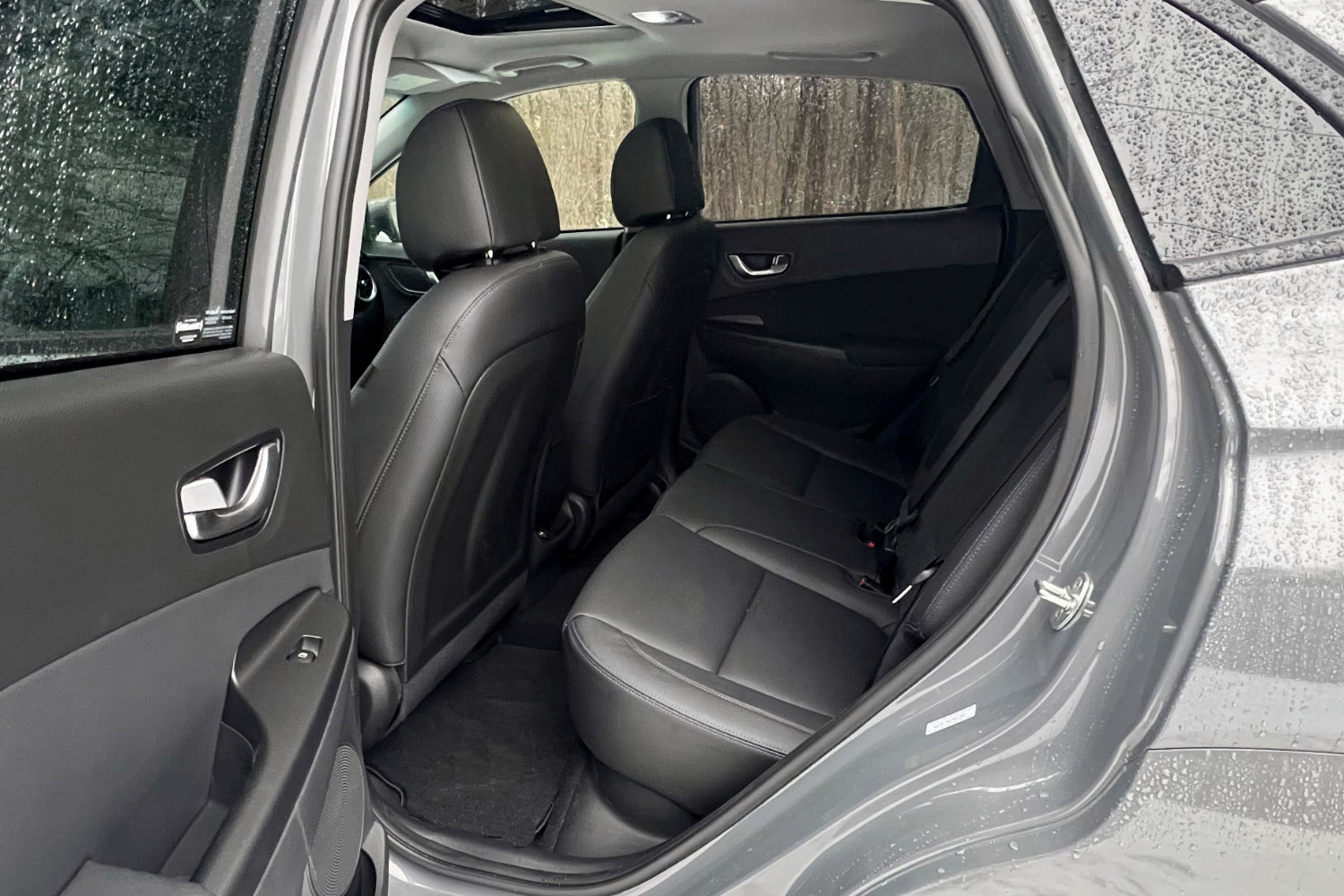 Thom Blackett
Thom Blackett
I found the Kona Electric's interior controls to be clearly labeled, intuitively located, and easy to reach. Hyundai placed two of them — labeled Heat and Driver Only — among the air-conditioning buttons. These are unique to EVs and play a part in managing the climate-control system's impact on an electric vehicle's actual range. During my time with the Kona Electric, I turned the heat on and off to maximize range and also tried using the automatic temperature control set to 75 degrees with the Heat button turned off. (As expected, this didn't produce any heat.)
Unfortunately, my attempt to stay warm without sacrificing range was a failure. Thankfully, the 2023 Kona Electric crossovers appear to have effective front-seat heaters. My Limited tester also included a very welcome heated steering wheel. You may want these features if you live somewhere you can see your breath in the January air.
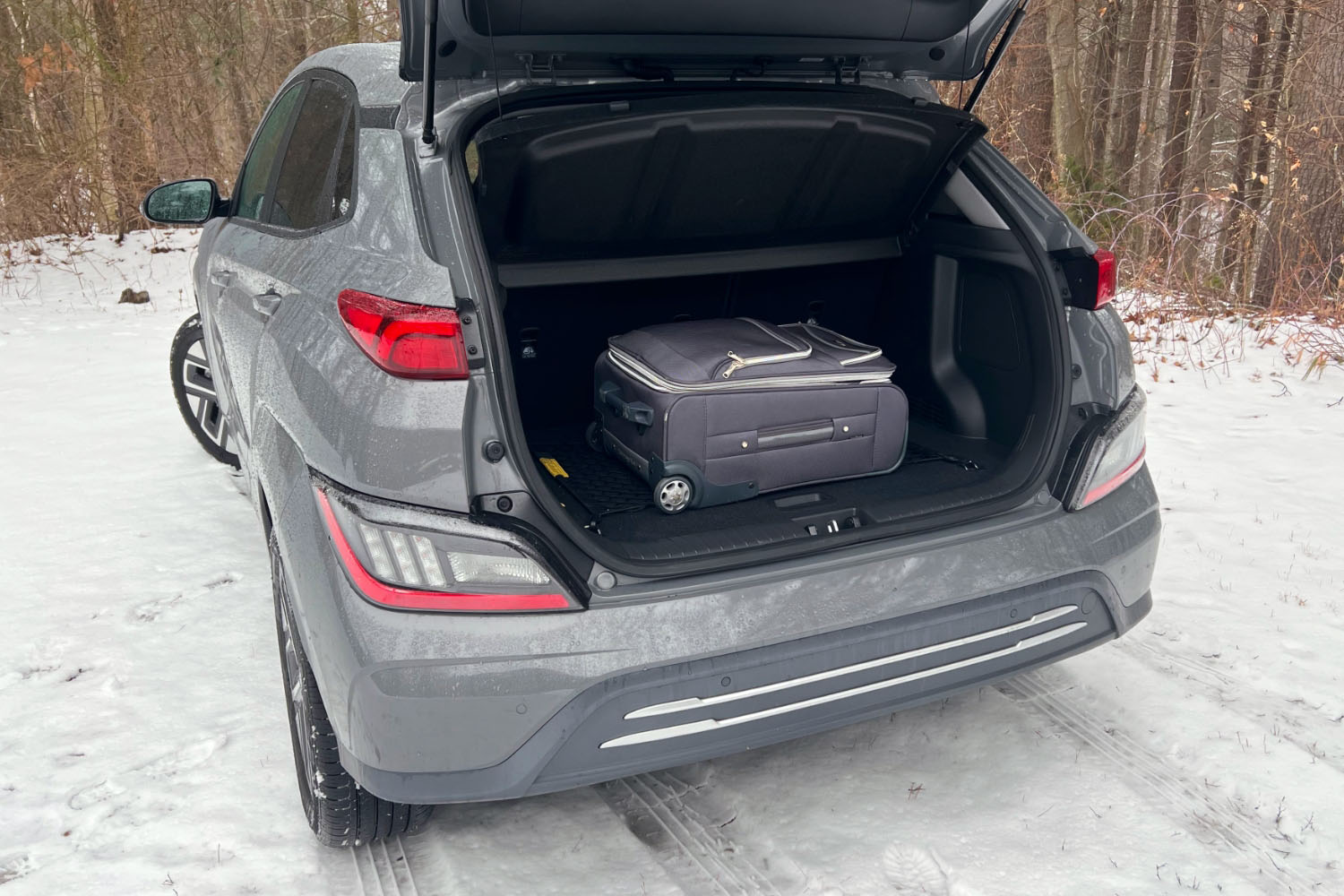 Thom Blackett
Thom Blackett
There's also an available power-adjustable driver's seat with lumbar, which I found ideally suited for my average build. Front passengers get a manually adjustable seat without lumbar and rear-seat occupants sit on a split-folding bench seat.
At five feet, eight inches tall, I found the Kona Electric's back seat surprisingly tight. Hard front seatbacks made the accommodations even more undesirable, but kudos to Hyundai for providing a USB port and a fold-down center armrest with cupholders.
On a more positive note, the 2023 Kona Electric provides 19.2 cubic feet of standard cargo space, or 45.8 cubic feet with the rear seat folded down. Still, that's less than you'll find in the Chevrolet Bolt EUV or Kia Niro EV. Other storage provisions include front and rear door pockets, a spacious glovebox and front center armrest, and a dual-level center console with power outlets and an integrated smartphone charger.
The 2023 Hyundai Kona Electric's Technology
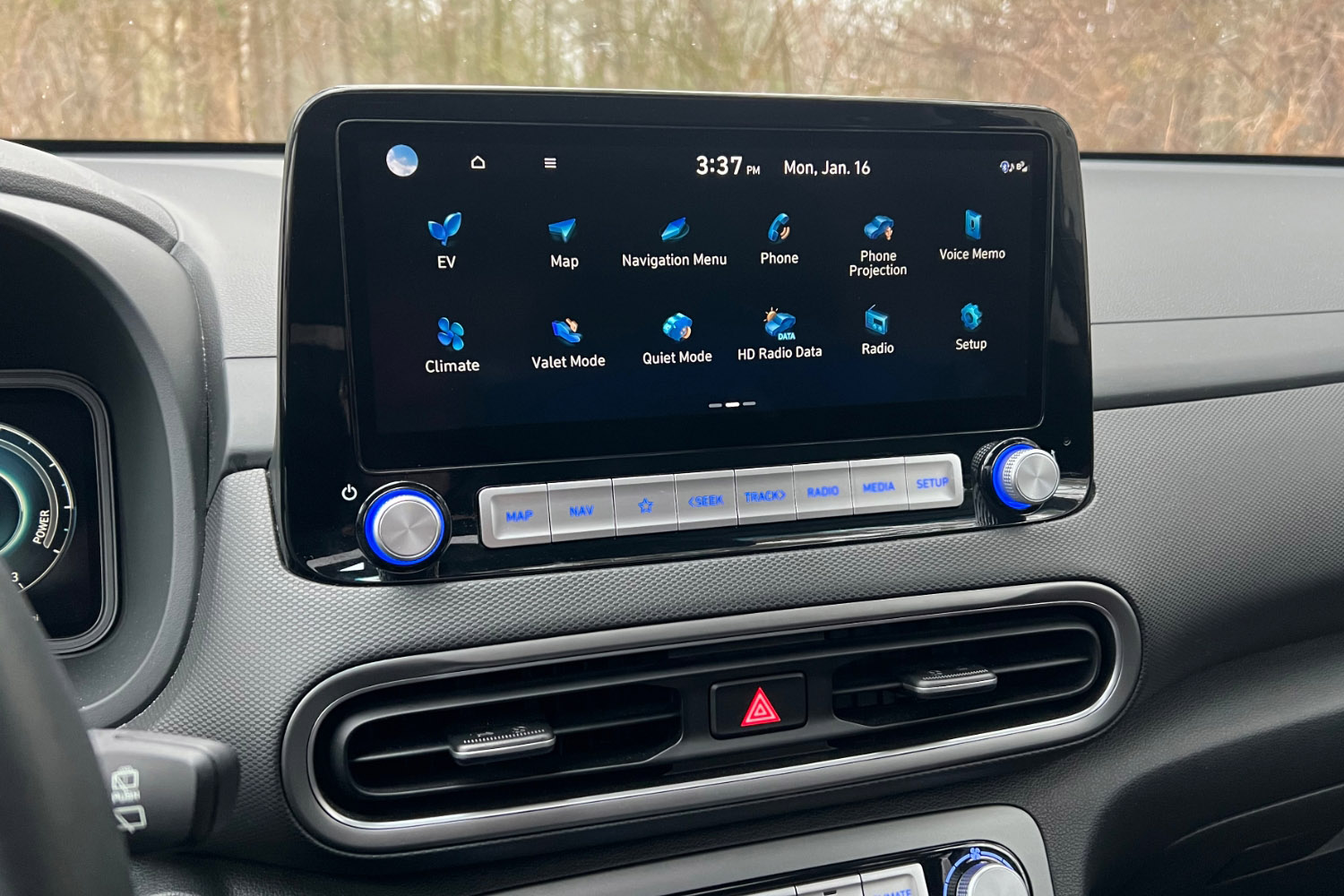 Thom Blackett
Thom Blackett
Interior tech on the Kona includes a Harman/Kardon premium sound system that's standard with Limited trim. Hyundai bundles it with a 10.3-inch touchscreen infotainment system mounted atop the center of the dashboard. As enjoyable as those features may be, they made a relatively small impact compared with the Kona Electric's excellent dynamic voice-recognition system.
Similar to the Amazon Alexa smart speaker you may have in your home, the Kona Electric's setup allows you to ask various questions and provide simple commands to perform tasks. For example, I pressed the Talk button on the steering wheel to request directions to the hospital and the system responded by providing me with a list of medical facilities.
The center screen displays what the system interprets from your speech, so you can easily spot a miscommunication if it happens. I was slightly shocked that this didn't happen during my evaluation, since I'm known to mumble.
The 2023 Kona Electric also comes with Apple CarPlay and Android Auto connectivity. It is wireless in the base SE trim with an 8.0-inch touchscreen, while the 10.3-inch touchscreen in SEL and Limited trims requires a wired connection through a USB cable. Aside from that minor inconvenience, setup is easy.
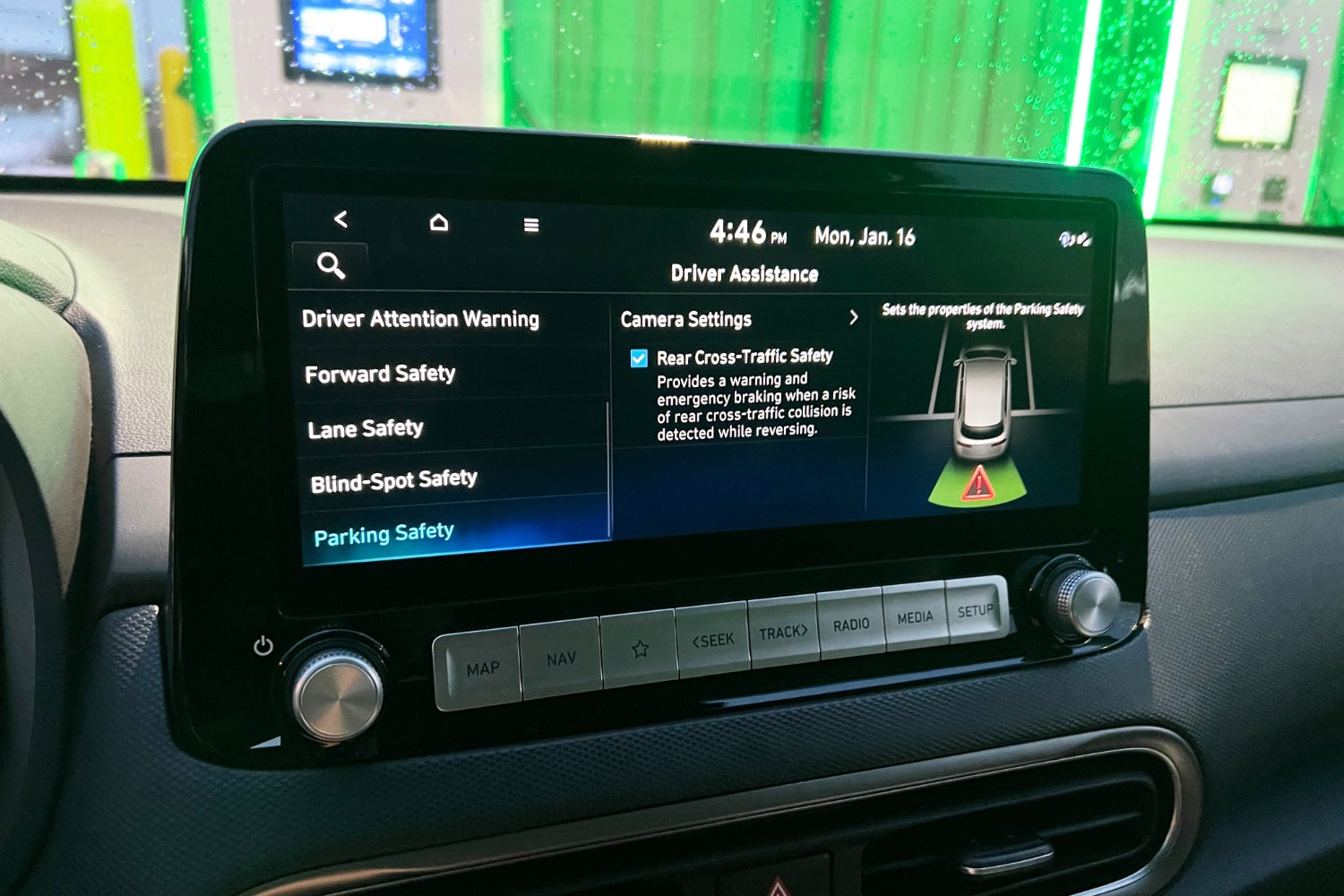 Thom Blackett
Thom Blackett
In addition, the 2023 Kona Electric offers the Hyundai SmartSense suite of driver-assistance systems, all of which you access via the Setup button on the center touchscreen. Among them is a driver-monitoring system that alerts you if you're showing signs of drowsiness or fatigue, a forward-collision warning with pedestrian detection and automatic emergency braking, and a safe-exit assist system designed to prevent children from exiting into the path of an approaching vehicle.
As its name implies, the lane-keeping assist system alerts you when you start to drift out of your lane and, if necessary, provides corrective steering. During my test drive, I found the system's action to be quite noticeable and less subtle than in some other vehicles.
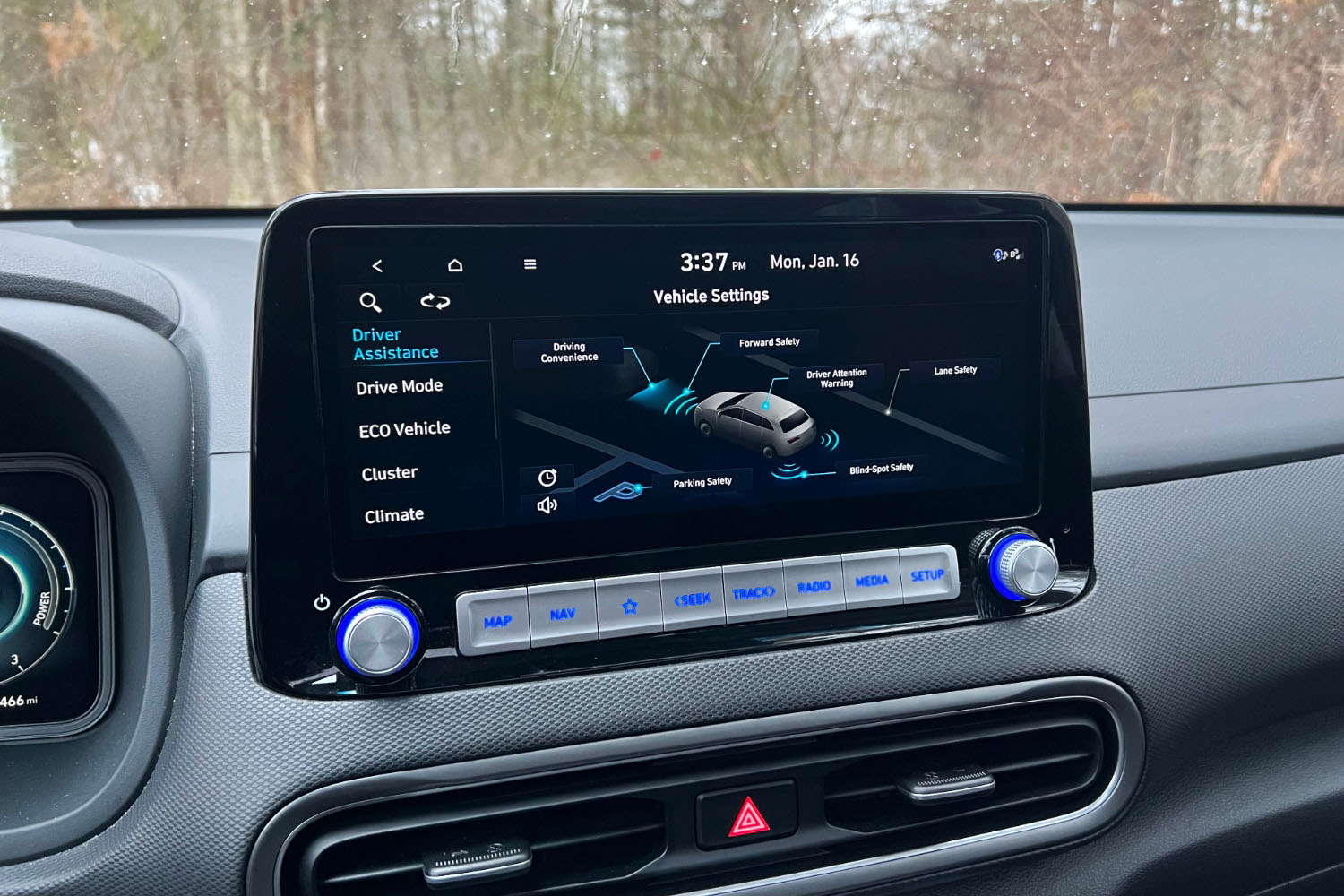 Thom Blackett
Thom Blackett
Hyundai also equips the Kona Electric Limited with Highway Driving Assist, which pairs adaptive cruise control with a lane-centering assist system to create a semi-autonomous driving aid. The technology works as intended, albeit with seemingly constant minor corrections. Even when the system is in use, the driver must keep both hands on the steering wheel.
At the time of this writing, the National Highway Traffic Safety Administration had not published crash-test results for the 2023 Hyundai Kona Electric. The Insurance Institute for Highway Safety, however, tested the non-electric Kona and gave all 2018 to 2023 Konas the highest rating for crashworthiness.
2023 Hyundai Kona Electric Driving Impressions
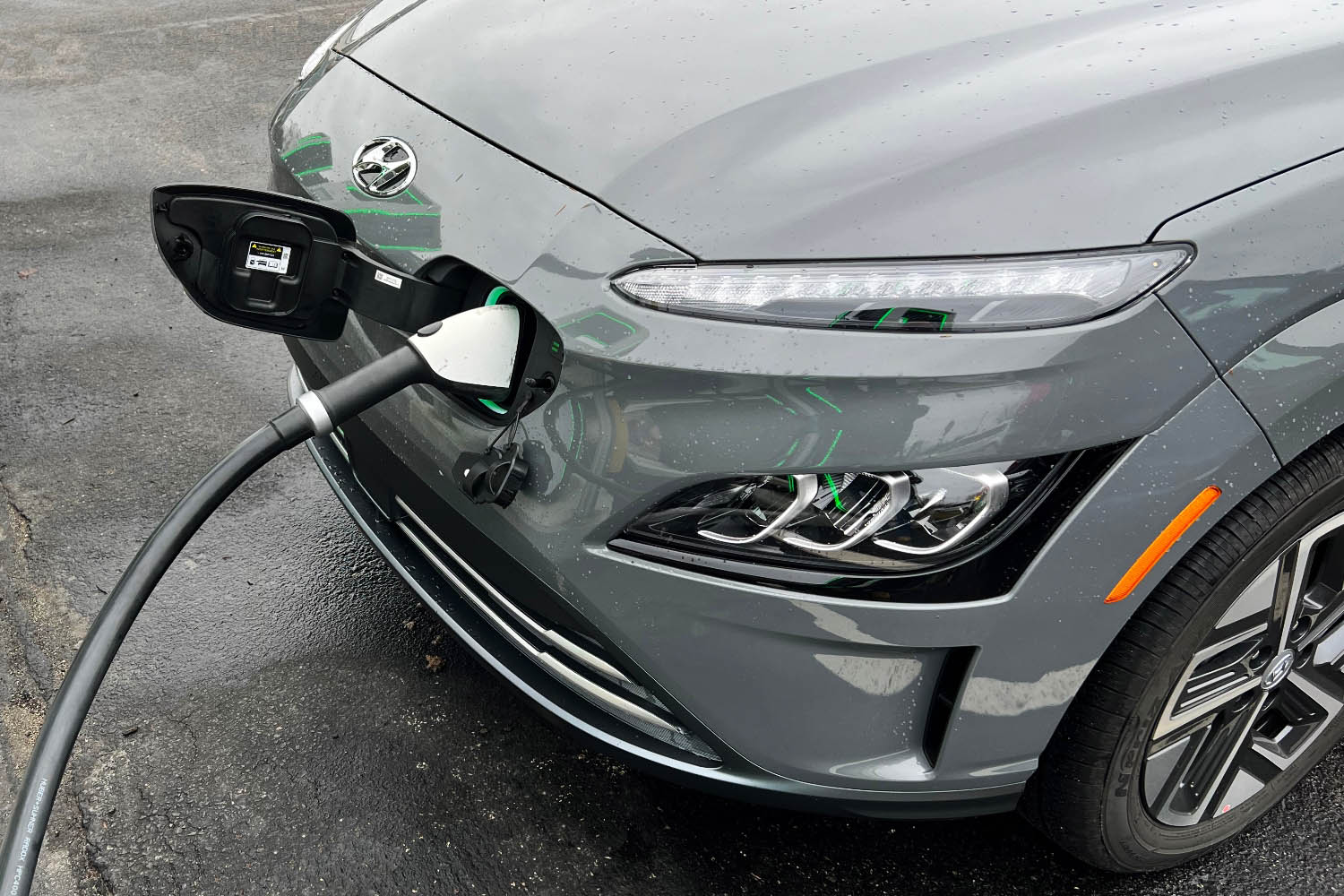 Thom Blackett
Thom Blackett
At the heart of the 2023 Hyundai Kona Electric is a permanent-magnet synchronous motor, equivalent to the gas engine in a traditional vehicle. It generates 150 kW (or 201 horsepower) and 291 lb-ft of torque. A 64-kWh lithium-ion battery provides the necessary power and a single-speed transmission delivers output to the front wheels.
From the driver's seat, the 2023 Kona Electric feels responsive and quick, as I occasionally traveled at 80 mph on the highway without noticing.
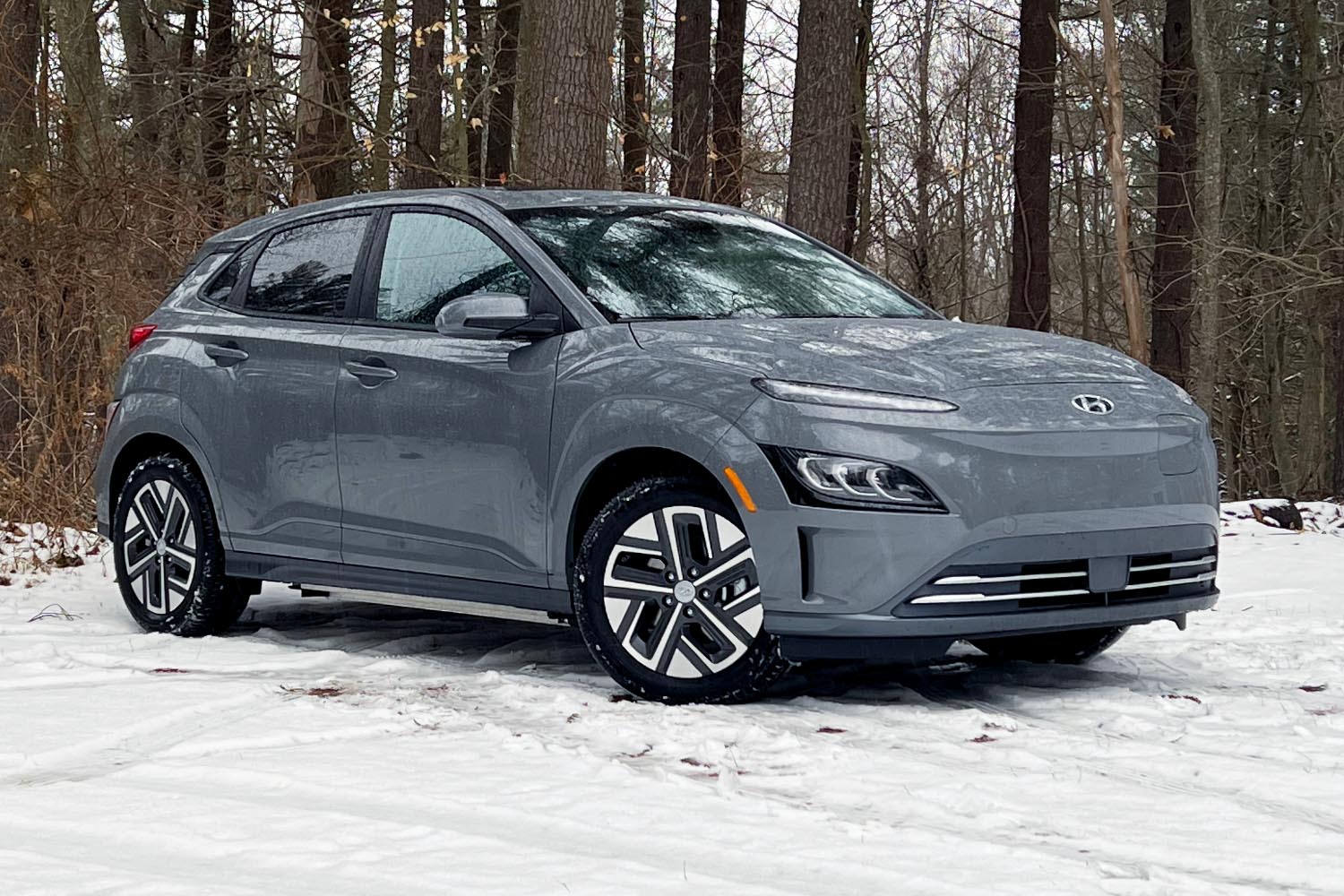 Thom Blackett
Thom Blackett
Similarly, the overall driving experience is typical of a small daily commuter car. Over some of New England's patchworked and potholed back roads, the Kona Electric did an admirable job of soaking up bumps without becoming unsettled. Sport mode squeezes a smidge of extra responsiveness from the steering and drive motor.
That said, this Hyundai falls short of being labeled fun, and I would've preferred more muted sounds from the suspension. Except for a quiet whir, there's no sound from the powertrain, so wind and road noise are more pronounced than they would otherwise be. And outward visibility is sufficient, despite thick rear roof pillars and large second-row headrests.
In terms of range, the EPA suggests the 2023 Kona Electric has a maximum distance of 258 miles and uses 27 kWh of energy every 100 miles (or 2.7 miles/kWh).
Hyundai delivered the car to my office with 199 miles of range displayed on the gauge cluster. I drove about 42 miles to get home, with roughly 30 of those on the highway at 75 to 80 mph. It was winter in New England, so I had the heat on for my comfort and to keep the windows defrosted. That 42-mile trip consumed 73 miles of range. The following morning, I returned to work, this time turning the heat on and off to preserve range, which still dropped by 58 miles for a 42-mile commute.
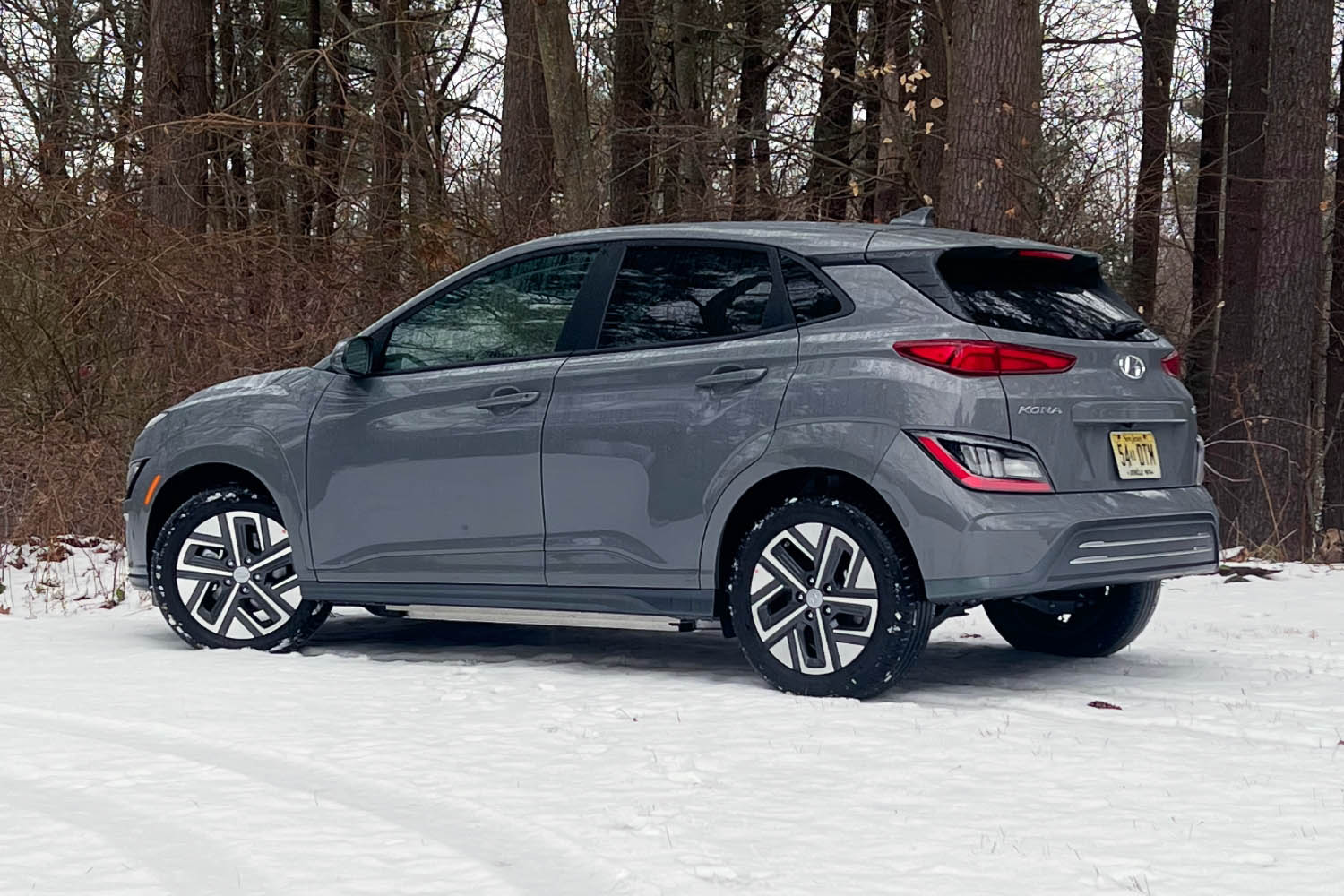 Thom Blackett
Thom Blackett
This is where things got a little stressful. According to the in-car computer, I had 68 miles of range remaining for the 42-mile drive home. To be safe, I'd need to find a charging station before making the trip, but first, there was a company dinner to attend a few miles away from the office. As luck would (not) have it, the navigation system's original route included an out-of-service bridge, so I had to take the long way to my destination. Using the heat sparingly, I arrived with about 50 miles of range left.
After dinner, I consumed another three miles of range driving to a Level 3 charging station that required one hour to raise my battery's charge from 24% to 80%. I was relieved to see the range had climbed to 214 miles and disappointed to see that drop to 181 miles when I turned the heat on. This pattern repeated throughout what was, admittedly, one of winter's coldest weeks.
In my time with the Kona Electric, it took just over an hour to charge from a 25% to 30% battery charge to an 80% charge. I never fully charged to 100%, so I can't verify the EPA's 258-mile maximum-range estimate. I averaged 2.9 miles/kWh but saw variations between 2.6 and 3.5 miles/kWh. Anything above 2.7 miles/kWh is less efficient than the EPA estimate.
Is the 2023 Hyundai Kona Electric a Good Electric SUV?
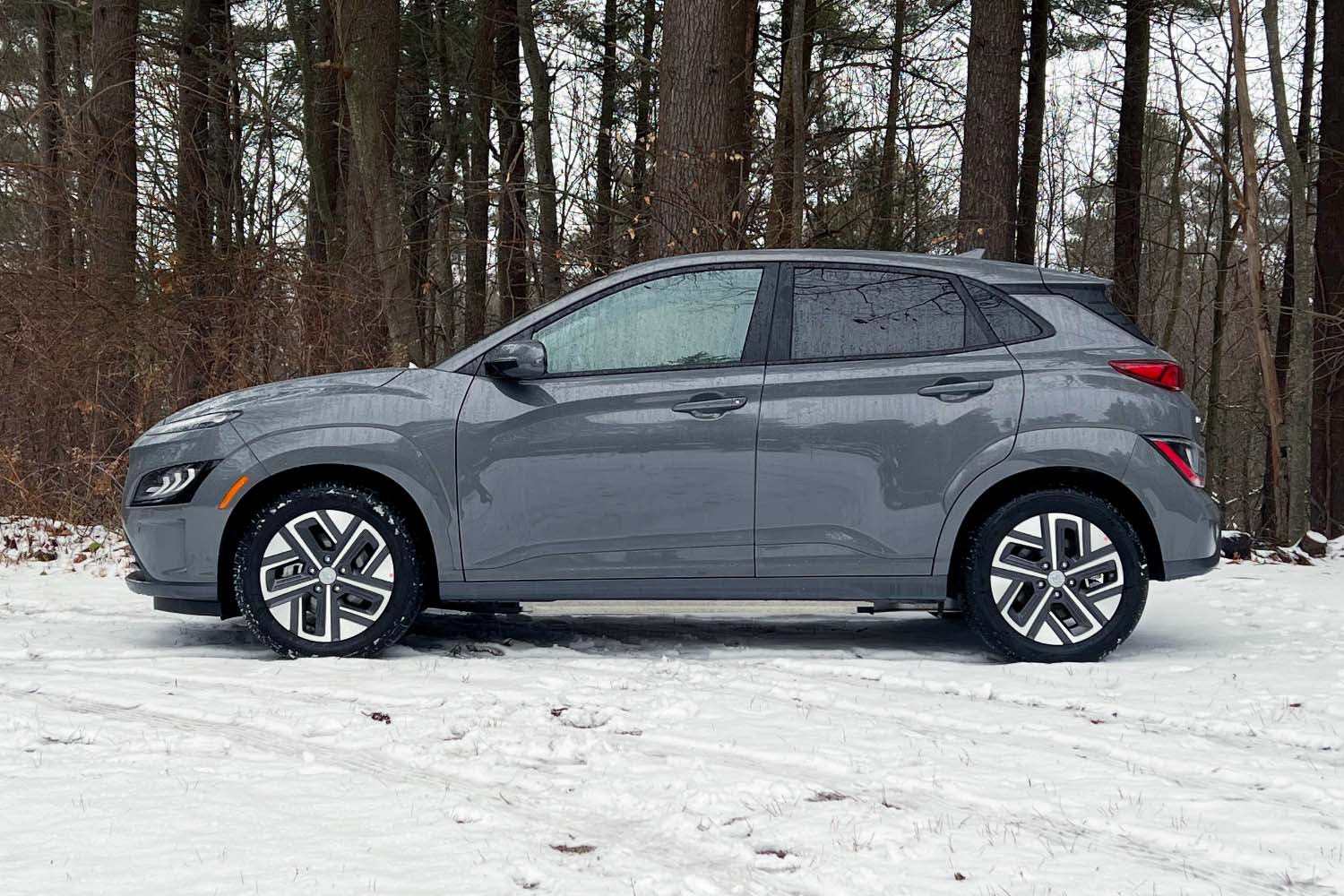 Thom Blackett
Thom Blackett
I've focused a decent chunk of this review on how using the heater impacts range. Some models likely handle it better than others, but this is not an issue unique to the Kona — battery sap in cold weather is an issue with any EV. As an apartment dweller, I must search for charging stations. If you own a home, you can install a Level 2 charger that will allow you to plug in whenever you want. That could alleviate any concerns about range and let you crank the Kona Electric's heat up to sauna level if desired.
If you choose a Hyundai Level 2 charger, you'll pay for the unit, parts, and installation. In contrast, Chevrolet will cover the installation cost for buyers of its 2022 and 2023 Bolt EUVs and EVs. Although Chevy doesn't offer the same kind of generous warranty coverage that Hyundai does (Hyundai's 60,000-mile bumper-to-bumper and 100,000-mile powertrain warranties are some of the best in the industry), the Bolt has slightly more cargo space (57.0 cubic feet with the rear seat folded) and a similar driving range (247 miles) to the Kona. If you're in the market for a subcompact EV, think about giving the Bolt EUV and Kona Electric equal consideration.
* The 2023 Kona Electric was available in the following states as of this writing: AK, AZ, CA, CO, CT, FL, GA, HI, MA, MD, ME, MN, NC, NJ, NM, NV, NY, OR, PA, RI, TN, TX, UT, VA, VT, and WA.
Written by humans.
Edited by humans.
 Thom Blackett
Thom BlackettEveryone needs a few things to be passionate about in life. For me, cars are near the top of the list. I’m constantly searching the classifieds for that bargain-priced, one-owner Datsun 240Z barn find. I’m always up for seemingly endless conversations about the cars we wish our parents had kept, the benefits of EVs versus the lure of a thumping V8, or which reliable crossover SUV best suits your family and your dogs. Needless to say, I feel fortunate to spend my work hours analyzing vehicle data, test-driving the latest all-new or updated models, and sharing the knowledge and insights I’ve gained with readers.
Related articles
View more related articles